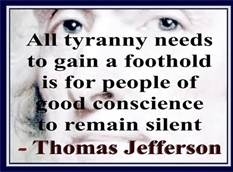I
looked at the word conscience which can be divided into: con and science. Con comes from contra which is Latin for against. Could it mean also against science or against
knowledge (intellect)? To follow one’s
conscience is a very heartistic (coming from the heart) matter, often it
doesn’t make any sense. I believe that
we all have a conscience but it has to be nurtured. It takes discipline to keep a clear
conscience, to keep out lies, false opinions, going with the flow of the majority,
etc. Here are some tips to strengthen
your conscience, 10 steps to get a conscience.
“Conscience is not an
infallible guide to behavior because it works according to the standards we
have adopted.”
~
Alan S.L. Wong
In
the tradition of the Abrahamic faiths (Judaism, Islam, and Christianity)
conscience is a
God-given faculty.
Sigmund Freud, (1856-1939) the Austrian neurologist, thought that the conscience is part of the Superego which
is the sum of things learned early in life about right and wrong.
In
any case it depends on a standard of right and wrong. When we consider the universal, natural laws,
we might find an absolute, otherwise it depends on which society, tribe,
organization one identifies with.
I
read Susan Cain’s book “Quiet.” She accounts for a historical view on how as
a society we changed from a “culture of character focus” to a society being fascinated
by extrovert personalities and
charisma. In a loud world where the
focus is on competition, success, and impressing one-an-other the quiet,
withdrawn person is all too often overlooked. That doesn't mean that the introvert has always a clear conscience. I only observe that it takes quietness to nurture one's conscience.
Where
does that leave the conscience? I
believe as a society we lost conscience.
When I look at our society today, I see people who are confused about
right and wrong. A standard of right and
wrong has to be reinforced, not just with laws which are important if they
apply for everybody in the same way. We
used to adhere to the “Golden Rule.” As
we have turned away from a “Nation Under God,” (America is not the greatest country anymore) we
find ourselves more and more drifting and people start to take the law in their
own hands.
"The media must
be free and must be self-governing. And self-governing media must also be a
moral media. A moral media use their freedom to project, preserve and promote
God-given human rights and dignity….A moral media must lead the fight against
drug abuse, pornography, and the many other destructive vices of society. Thus,
the media must become the conscience of society.”
~
Rev. Sun Myung Moon
A
standard of integrity and honesty can only be followed when both mind and body
work together focused on principle and ideals (like the constitution).
Part
of an effective conscience is that we may feel guilty when we have done
something wrong.
How
to get rid of guilt?
Guilt
is an emotion that occurs when a person believes that they have violated a
moral standard that they themselves believe in.
Contrary to shame which is believed that: I am bad, guilt comes from
behavior. Guilt is both a cognitive and
an emotional experience that occurs when a person realizes that he or she has
violated a moral standard and is responsible for that violation. A guilty
conscience results from thoughts that we have not lived up to our ideal self.
The
benefit of feeling guilty is that it can be removed through remorse, rightful
actions and forgiveness. In the
Christian tradition we talk about grace which comes from God to anyone who
shows regret and removes himself from the wrongdoing. Regret thinks, "What can I do now to
repair past damage and prevent future harm?" Since we only can change
things in the present, regret focuses on the present.
Regret
acknowledges the goodness of oneself in the present, rather than identifying
with negative images of oneself from the past and the future. Regret is self-affirming rather than
self-hating and feeling responsible for any offense.
“The root of
conscience can only be in God.”
~ Rev. Suyn Myung Moon
We
are humans having a spiritual experience in this physical body. On our journey here on
earth we are bound to
make mistakes. I believe that we are not
responsible for what happens to us only how we respond to it. If we act in good conscience we can achieve a
level of peace and mental freedom which we all desire.
“Words can never
adequately convey the incredible impact of our attitudes toward life. The
longer I live the more convinced I become that life is 10 percent what happens
to us and 90 percent how we respond to it.”
~
Charles R. Swindoll 

















